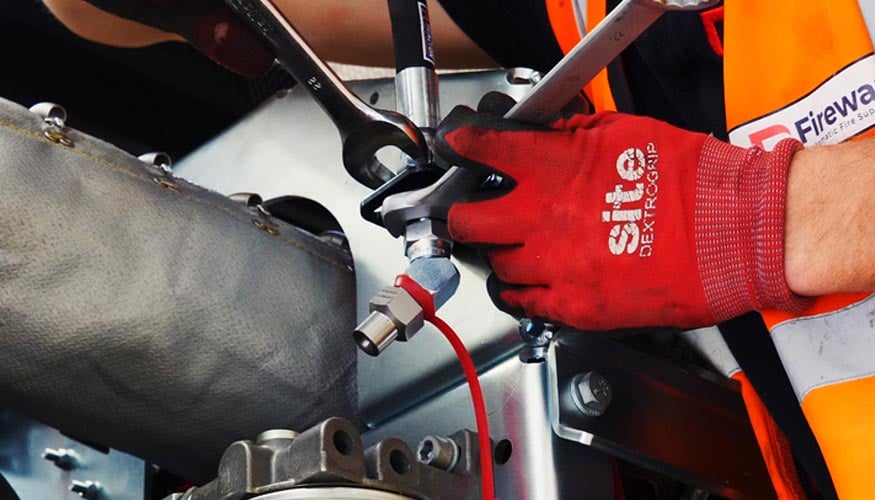Having your premises kitted out with the requisite fire safety equipment helps to protect both your site as well as the people in and around it. But while having these individual pieces of equipment fitted is a great start, looking after the safety of your building is an ongoing task that you shouldn’t just ignore.
Put off by the cost of servicing and maintenance for fire safety equipment, it often boils down to one simple point: if you don’t have them serviced, why bother having them? While the odds may feel slim that a fire extinguisher will malfunction, it could end up costing you tens of thousands of pounds – or worse, a life – if a fault does happen to occur just as you need it to tackle a fire. With this in mind, take a look at our guide to the most common fire safety equipment faults and their consequences to highlight the importance of fire safety equipment servicing.

-
Fire Alarms
What they’re for – Fire alarms are great warning systems to alert whole buildings to the possibility of a fire. By alerting people early, it allows everyone to file out safely to a designated point and await the assistance of the fire services. Fire alarms are a legal requirement for commercial premises but there is little emphasis placed on the upkeep of the system.
Common faults – Many faults for alarm systems involve power failures, requiring a system to be reset, but ground faults can also put the system out of action by knocking out the power to certain circuits. Also, a rare occurrence, but if your premises sustain water damage this could knock out your system if the water manages to encroach on the circuits.
Why service them? – While many systems will have a control panel to tell you when there has been a fault, you may be unaware of a circuit that has been lost or the system may not spot the fault itself. A professional will be able to test the system fully to illuminate any hidden faults which may have developed, especially key if you have a building filled with alarm points to look after.
-
Fire suppression systems
What they’re for – Automatic fire suppression systems are the ultimate way to tackle fires, triggering within seconds of the heat rupturing a trace tube. These can be fitted as direct or indirect systems and require no manual input or mains connection.
Common faults – With very little electronic equipment attached to the system and no human input required, fire suppression systems are less likely to develop faults. However, it could be that the suppressant simply needs topping up or that a part has become damaged and needs repair.
Why service them? – Not servicing your suppression systems renders them utterly pointless, as you’ll never know whether they are going to work or not. You need to have full confidence in your systems and this is something that requires professional attention.
-
Fire doors
What they’re for – Fire doors are specially designed doors that help to contain fires when they break out, allowing people to make their escape and confine fire damage to as small an area as possible.
Common faults – Whether a door has become jammed, the seals are missing or the hinges haven’t been fitted correctly, there is a lot that can go wrong with a fire door.
Why service them? – According to The Fire Door Inspection Scheme survey, 677 fire doors across 31 premises had faults, highlighting just how bad things are. Having your doors inspected may only take a matter of minutes, but you’ll then have the peace of mind that they’ll do their job properly should the worst happen.
- Sprinkler systems
What they’re for – A sprinkler system will erupt via individual points when they detect the heat of a fire, although not all at once. This then releases water into that area in the hope that the water will not only tackle the blaze but also dampen the surrounding area to prevent it from spreading.
Common faults – There are many things that can impact the performance of a sprinkler system, particularly if it sits unused for years on end – pressure being of particular importance here. Rust is one of the most common causes of faults for the components, along with the water in the system freezing and causing pipes to burst.
Why service them? – Having a sprinkler system checked over will highlight any issues and any parts which might need replacing. With a system check, you can be assured that it will kick in when it is needed most rather than letting you down.
- Emergency lighting
What it’s for – When a building experiences a fire it may cut the power to the building, in this instance, the emergency lighting kicks in to light the way out of the building for anyone left inside.
Common faults – A battery-powered piece of equipment, one of the most common faults for emergency lighting not working is dead batteries. If not the batteries then the lamps themselves could be at fault, leaving people in the dark.
Why service it? – Nobody wants to be left stuck in a dark warehouse or corridor when the power goes out for any reason. Servicing emergency lighting ensures people can find the exit in an emergency, something which could save lives and avoid injuries.
-
Fire extinguishers
What they’re for – We all know how fire extinguishers can help tackle a flame while it’s still in a controllable state, but many people aren’t aware that there are different types of extinguishers for different types of fire, e.g flammable liquids, electrical fires, solids fires. These should be used to tackle a small fire to stop it from spreading.
Common faults – Fire extinguishers are usually sitting around for years on end before use, leaving them prone to rusting and weakening. In addition to this, you may not realise when someone has tampered with an extinguisher, releasing the contents and turning it into a dud when someone actually needs it.
Why service them? – Fire extinguishers should be serviced by a BAFE approved company to guarantee they have been inspected by a certified engineer. By servicing and maintaining all the different extinguishers you have on-site you can ensure the safety of your staff, visitors and your premises.
-
The Regulation Gap
Since 2006, it’s been down to the building manager or employer to take care of fire safety in a building. This responsibility has been taken away from officials, but this has proven to be dangerous in most cases with standards slipping in terms of fire safety.
The transfer of responsibility has already cost lives, with the hotel industry showing a distinct lack of effort in servicing and maintenance of fire safety equipment. In 2007 the Cornish Penhallow hotel was engulfed by flames, costing three lives. The owners were handed a fine for this as well as for failing to meet safety standards. Meanwhile, a hotel in Harrogate also saw the loss of life, resulting in yet more calls for better safety laws.
Currently, businesses are not under any real scrutiny to uphold the standards which would see regular servicing and maintenance of all fire safety equipment, with many either forgetting or simply trying to save on the cost.
All it takes to save a life is for companies – particularly those in charge – to carry out fire risk assessments and have servicing and maintenance checks on a regular basis for all fire safety equipment.
-
Fire suppression service and maintenance
At Fireward, we not only supply and install fire suppression systems, but we also service and maintain them too. There is little point in investing in safety equipment if you’re not going to have them inspected at regular intervals to ensure they remain in top condition.
Whatever industry you operate in, it’s vital to make fire safety a top priority. To learn more about our servicing and maintenance options for fire suppression systems, simply contact our professional team today and we’ll be happy to discuss your requirements.
Fireward, Protecting People and Assets 24/7.
To find out more about how Fireward’s Automatic Fire Suppression systems, get in touch by calling 0800 151 0249 or email at: sales@fireward.co.uk


